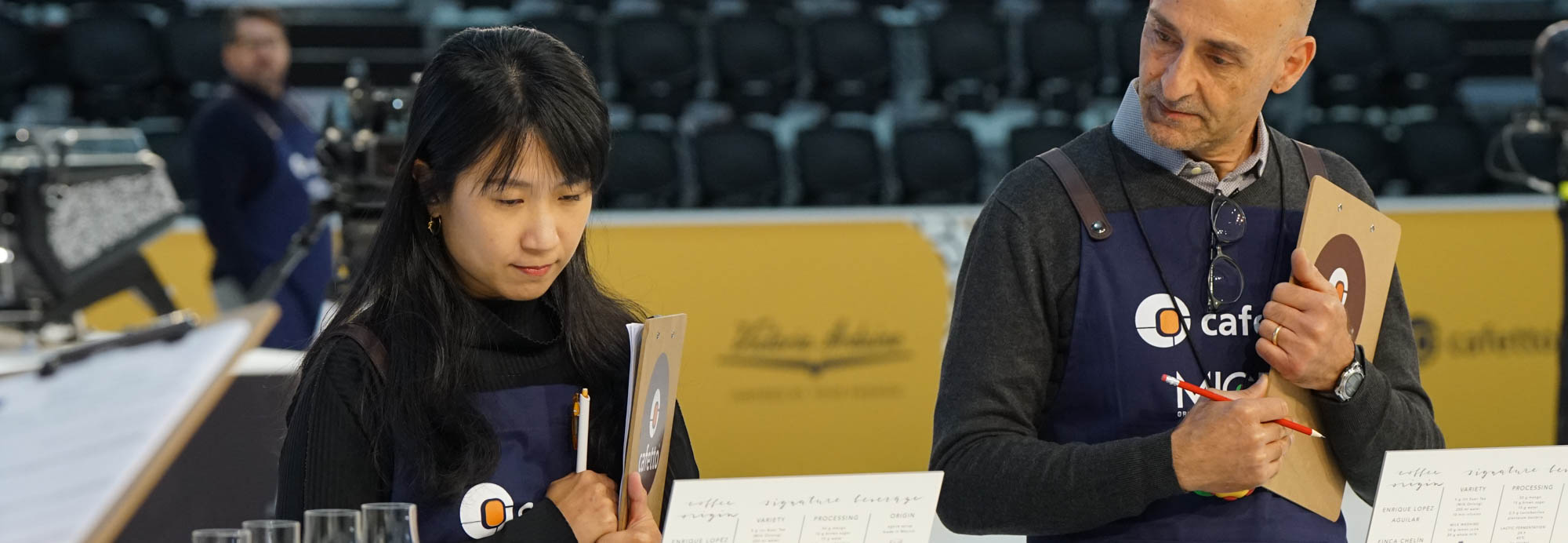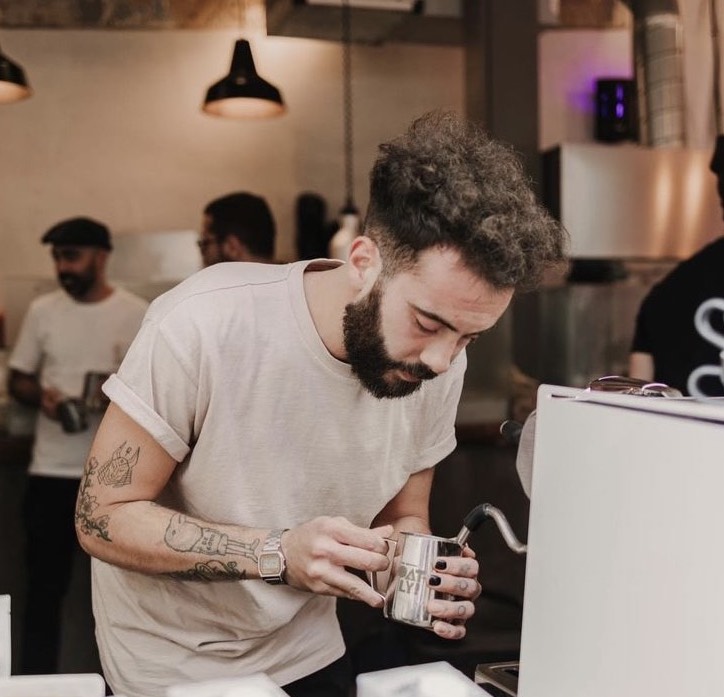How can coffee professionals train to become a World Coffee Championships judge?
When it comes to the World Coffee Championships, we usually first think of the competitors taking part in the seven annual competitions. And understandably so – these coffee professionals spend months training to vie for some of the most prestigious titles in the industry.
But judging is also an integral part of these competitions. Highly-trained and well-calibrated judges are essential to the success of any World Coffee Championships event.
So how can industry professionals train to become one? To find out, I spoke to Danilo Lodi and Ania Oleksak, two qualified WCC sensory judges. Read on to learn more.
You may also like our article on how coffee professionals can train for the World Cup Tasters Championship.
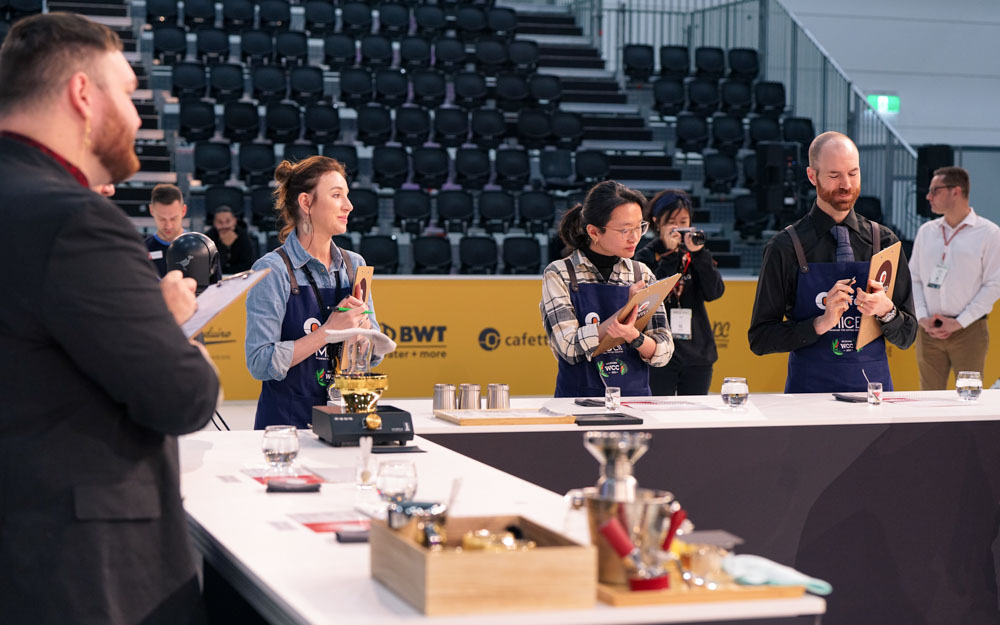
What are the first steps to becoming a WCC judge?
Every year, World Coffee Events hosts seven World Coffee Championships. These are:
- World Barista Championship
- World Brewers Cup
- World Cup Tasters Championship
- World Coffee in Good Spirits Championship
- World Latte Art Championship
- World Coffee Roasting Championship
- World Cezve/Ibrik Championship
Although the rules and regulations for each respective competition vary widely, judges are a big part of them all (except the World Cup Tasters Championship). As with any other competition, the judges have the responsibility of assessing and scoring each competitor’s performance against a set of specific criteria.
Danilo Lodi is the Business Development at Dalla Corte and a coffee consultant. He is also a qualified World Barista Championship sensory judge.
“First and foremost, becoming a certified WCC judge is dependent on how much you are invested in the competitions, and not necessarily on your role or status in the industry,” he says.
“To qualify as a sensory judge, you could have held a number of positions in the coffee sector, but you certainly need to have some level of coffee knowledge,” he adds.
A judge’s coffee knowledge should cover all levels of the supply chain, as well as a wide range of skills – which are largely dependent on the competition they are interested in judging. For instance, coffee professionals who want to judge at the World Barista Championship need to know how to taste coffee, alongside being able to assess a competitor’s technical and hospitality skills.
Gaining formal experience
Ania Oleksak is a certified Q grader and R grader. She is also a qualified sensory judge for the World Barista, World Brewers Cup, World Coffee in Good Spirits, and World Coffee Roasting Championships, as well as a World Latte Art Championship visual judge.
“You need to be able to pass a set of tests to become a WCC judge,” she explains. “These tests are based on coffee knowledge, sensory and practical skills, and your understanding of the competition rules and regulations.
“You don’t need to be a seasoned professional, but you do need at least two years’ experience judging national competitions, or one years’ judging experience and to pass the World Competitions Educational Program (WCEP) course.”
Danilo emphasises the need to gain experience judging national Coffee Championships.
“You have to start by judging national competitions to strengthen your coffee knowledge,” he tells me. “You need to know how to taste coffee if you want to be a sensory judge, or if you want to be a technical judge, you have to understand how to assess competitors’ skills.”
Alongside taking part in national Coffee Championships, prospective judges need to also pass a two-day WCC Judge Certification course, which they must pay for. Candidates can certify for the World Barista Championship, World Latte Art Championship, World Brewers Cup, World Coffee in Good Spirits Championship, World Coffee Roasting Championship, and the Cezve/Ibrik Championship – but they must choose between qualifying as either a sensory or technical judge.
As part of the course, participants take written and practical tests to assess their judging capabilities. Once completed, they receive a Judge Certificate which is valid for up to three years.
Attending calibration sessions
In order to make sure the judging process is fair and consistent, all WCC judges must attend calibration sessions before the competitions take place.
“There is a two-day judge calibration session preceding every World Coffee Championship event,” Ania says. “These sessions are coordinated and led by Judge Operation Leads and SCA staff.
“Judges have to take part in practical competition run-throughs, bias training, sensory exercises, and workshops which discuss the latest trends in the coffee industry to make sure our palates are as calibrated as possible,” she adds.
At every WCC event, the team of judges is presided over by a Head Judge, who provides guidance and may need to approve scores which are considered too low.
“Furthermore, every day that the competitions take place, all judges have to take part in another calibration round, too,” Danilo explains.
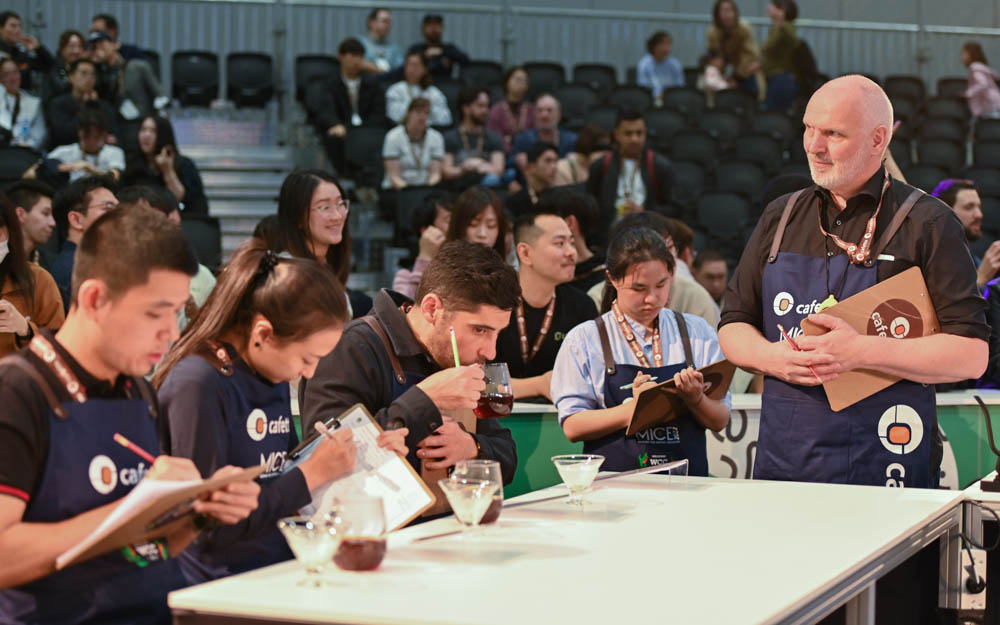
Judges for different World Coffee Championships
Besides the World Cup Tasters Championship, all WCC events rely on judges to assess and score competitors’ performances. However, each competition has its own set of judges.
Let’s look at the World Barista Championship as an example. Alongside a Head Judge, this competition also includes both a sensory and a technical judge.
The former largely focus on assessing the quality of the drinks served – which are espresso, milk-based beverages, and signature beverages. Sensory judges will also evaluate how accurate the competitor’s taste descriptors are, as well as the overall beverage experience.
Technical judges at the WBC, meanwhile, need to pay attention to a competitor’s workflow and practical skills for all three beverage courses. These can include using clean cloths, consistently dosing and tamping coffee, and purging the steam wand, to name a few.
Judges also score competitors based on several other aspects of their performance, such as total impression of their routine. Among other factors, this score acknowledges their level of passion and enthusiasm for specialty coffee.
At the 2023 World Barista Championship, however, there have been some major changes as to how these aspects are assessed and scored. Looking at total impression in particular, the score has been broadened somewhat, and now includes several prompt questions such as:
- Did the performance inspire a deeper connection to coffee?
- Was the experience immersive, thought-provoking, or otherwise important to specialty coffee?
- Would this barista have inspired me about specialty coffee?
- Did the performance celebrate the craft of coffee?
Ultimately, this means judges also have to evaluate the overall concept of a WBC competitor’s routine. In turn, they need to take a more holistic approach to judging, as well as remaining objective.
To determine a WBC competitor’s final score, points from both sensory and technical judges are combined.
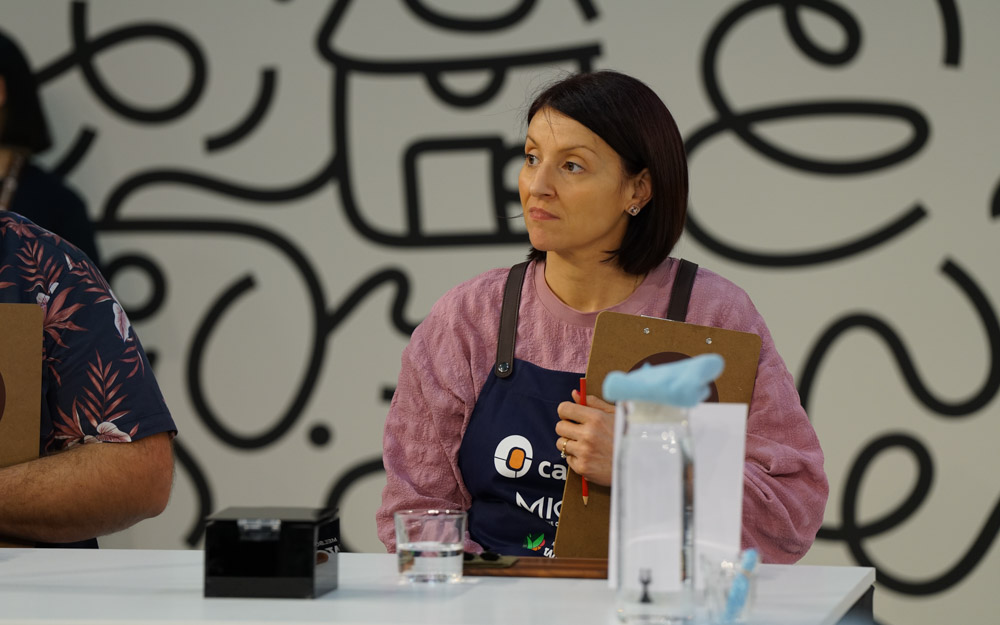
Tips & advice for training to be a WCC judge
With each World Coffee Championship having its own set of unique rules and regulations, choosing which competition to qualify for as a judge is largely based on where your interests and preferences lie. For instance, if you have more experience with roasting, then it’s probably more logical to certify as a World Coffee Roasting Championship judge.
It’s also important to note that WCC judges are volunteers – meaning they don’t get paid for their services. However, that’s not to say that these positions aren’t rewarding in other ways.
“It’s a big honour and a huge responsibility to be a certified judge,” Ania says. “Every judge will feel a little bit differently, but the most important thing for me is to stay focused and direct all of my attention to the competitors.
“Before I became a WCC judge, I was a national Barista Championship coordinator, which helped me to understand the structure of the competition,” she adds. “The WCEP course is also a great way to learn about judging, to test yourself, and to receive feedback from professional judges.
“Moreover, enrolling on a SCA course will help develop your sensory and technical skills, as well as your sensory lexicon,” Ania continues.
Remaining open to new experiences
Danilo has some advice for prospective WCC judges, and emphasises the level of dedication it takes to be successful.
“You need to understand the competition rules by heart,” he says. “I’ll also push myself to get out of my comfort zone by trying as many different coffees as possible, as well as visiting many different coffee shops wherever I go.
“When you’re trying coffee – whether as espresso, a milk beverage, or even a signature drink – make sure you pay attention to everything,” he adds. “What flavours can you taste? And the levels of sweetness, acidity, and bitterness? What is the body like, as well as the texture?”
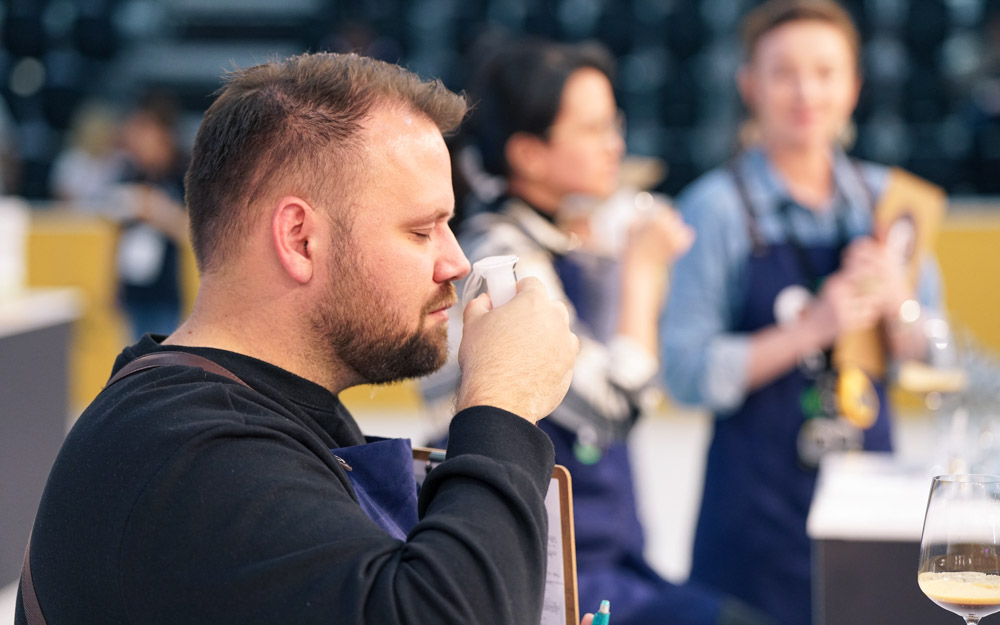
Becoming a qualified World Coffee Championship judge may not be for everyone, but they certainly play a very necessary role in these competitions. Without judges, we wouldn’t have such esteemed and highly-respected events in the global coffee industry.
Although it can be a lengthy and costly process, choosing to certify as a judge can also be a rewarding experience for many industry professionals – and may even be a stepping stone in their coffee careers.
Enjoyed this? Then read our article on how to prepare for the World Barista Championship.
Photo credits: World Coffee Events, Specialty Coffee Association
Perfect Daily Grind
Want to read more articles like this? Sign up for our newsletter!

